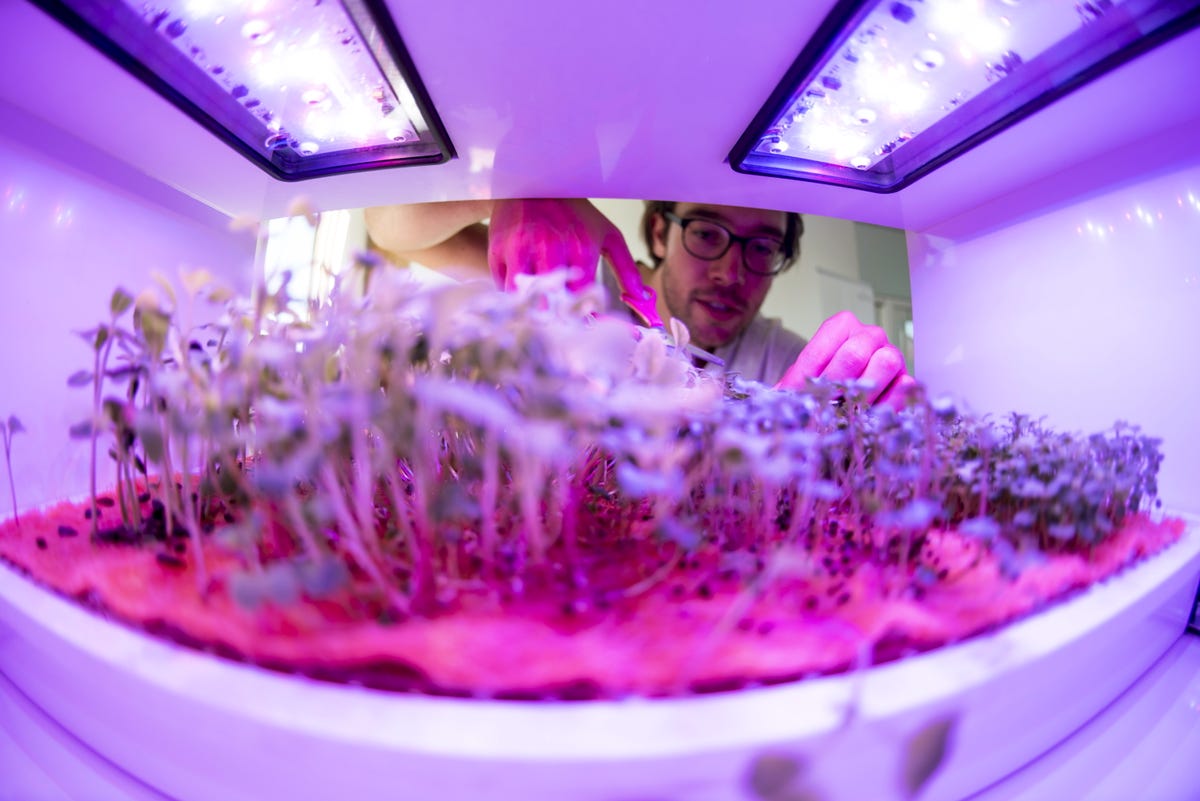Mind-blowing things your appliances will do in the future (pictures)
An oven that roasts coffee. A garden next to the fridge. A robot chef. Welcome to your future kitchen.

Your kitchen may soon be smarter than you
Home automation systems already have made houses pretty smart. But one room inside that house, the kitchen, is about to get a huge boost in IQ. Take a look at these concept, prototype and soon-to-be-debuting appliances.
A literal kitchen garden
The Munich-based startup Agrilution recently showed off this prototype for an automated indoor veggie garden.
The machine, called "plantCube," is the size of a common built-in fridge and uses LED lamps to generate different climates within a single unit.
Your 3D printer will customize your kitchen
In 2014, FirstBuild teamed with MakerBot, the 3D-printing company, to launch a "Chilling Thingiverse Challenge" to would-be inventors. The goal: Create new ways to optimize the fridge using 3D printing.
Of course one brainstorm had to be a pizza box storage rack, that white whale of takeout warriors everywhere.
Look to the Cooki
Blue Apron might look passe in just a few years; Sereniti is working on a robotic chef called Cooki, which can cook an entire meal in a space the size of a coffee maker.
The future is pods
To cook a meal, a user loads the machine with fresh, packaged ingredients (such as the ones shown in the tray pod here); syncs a smart device to Sereneti Kitchen's Foodi recipe engine; and pushes one button to enable cooking.
The machine adds each ingredient at precisely the right time.
When the dish is finished, a message is delivered back to the user's smartphone, telling them dinner is served.
Your oven will roast more than turkey
Why roast just meat when you can also roast your own coffee beans?
That was the idea that led Joshua Longenecker (left) and Rick Suel to devise an oven attachment that can roast coffee. The invention made its debut earlier this year, at the FirstBuild Hackathon.
GE's response to the maker movement, FirstBuild is a micro factory that gathers ideas for new appliances and uses small-batch production to manufacture them.
It will all be powered by trees
This is an eTree, a prototype solar canopy developed by Sologic and on display in Israel.
In addition shade, it provides a cold water drinking fountain, free Wi-Fi, a docking station to charge smartphones and tablets, and outlets for electrical appliances.
It also has a water dish for dogs and lights that come on when it becomes dark.
No space will be wasted
If this appliance of the future looks a little simple, that's because it is -- in a good way.
Is this the future of dishes?
Inventor Chen Levin has created a hand-cranked, water-efficient machine that doubles as a drying rack and that uses centrifugal force to get the job done. The Circo dishwasher is reportedly in the final prototype stage.
We're talking very smart coffee
And speaking of centrifugal force: Your coffeemaker may soon benefit from it, too. Spinn is working on a coffee maker that uses no pods or filters (but does use centrifugal force) and that automatically orders new beans from local roasters when the household supply gets low.
Your fridge will take notes
Never again wonder who drank all the orange juice and left you with none.
As part of the FirstBuild Hackathon, Bobby Lindsey (left) and Wesley Bornor, debuted their idea for a refrigerator sensor that measures volume of liquids and reports those levels to a smartphone.
Your pasta will cook itself
Your pasta will be even more fattening in the future because you won't even burn the calories necessary to cook it.
Matt Hart (center) and his FirstBuild Hackathon team used the event to work on a self-cooking pasta machine.
And it'll all be recorded
A new wearable technology developed at the University of Washington is called MagnifiSense. It can sense what devices and vehicles the user interacts with throughout the day,
And maybe you'll use fewer appliances?
The sensor, worn on the wrist, uses unique electromagnetic radiation signatures generated by electrical components to pinpoint when someone flicks a light switch, turns on a stove or even boards a train.
The idea: Track a user's carbon footprint. Suddenly that hand-cranked dishwasher is looking even better.
You just might have two kitchen gardens
We're thinking that in-kitchen gardens may be the first futuristic appliance on the market; Doug Holbrook (center), of Louisville, demonstrated his team's own self-contained kitchen cabinet garden at the FirstBuild Hackathon.